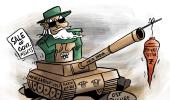Moody's Investors Service on Thursday said the credit downturn arising out of COVID-19 will be short-lived but most economies will not return to pre-pandemic activity levels until 2022.

In the year since the World Health Organisation (WHO) declared COVID-19 a pandemic on March 11, 2020, the virus has disrupted the global economy and triggered a credit downturn accompanied by a spike in bond defaults.
"The credit challenges arising from COVID-19 have been substantial, but the credit downturn likely will be relatively short-lived.
“Risks remain more significant for the sectors most vulnerable to restrictions on their normal activities," Moody's said in a global report in coronavirus.
Stating that most economies will not return to pre-pandemic activity levels until 2022, Moody's said it expects a slow and bumpy global recovery and uncertainty around the macroeconomic outlook remains much higher than usual.
Policy actions will continue to support economic activity and financial markets after the pandemic has eased, it added.
Policymakers will continue to support economic activity long after the pandemic has faded, in some cases for years, Moody's said.
Moody's expects the incidence and prevalence of the pandemic to gradually decline over the course of this year, as vaccination numbers rise.
In turn, this will allow governments to gradually ease lockdown measures.
However, a residual level of COVID-19 likely will persist over time, raising the prospect of global pockets of risk in regions where vaccination progress is slow, and of localised outbreaks.
"In addition, new mutations that increase the virulence or spread of the virus pose a key risk to efforts to normalise conditions.
“Rather than eliminating the virus, we expect to 'learn to live with it' at low case rates," it added.
The rating agency said it took several rating actions in response to the credit consequences of the pandemic and does not expect to conduct another wholesale review of credit ratings this year unless there is a significant shock to the global economy or to financial markets, or a shock resulting from a dramatic change in the trajectory of the virus.










